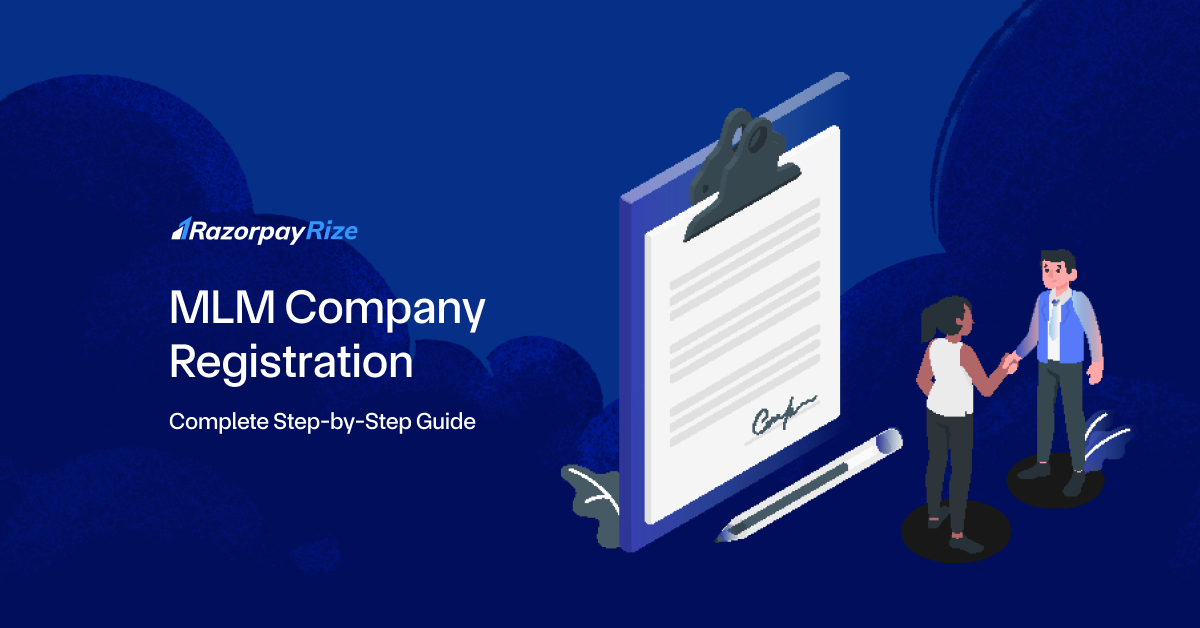Multi-level marketing (MLM) has emerged as a popular business model across industries. It offers a unique way for companies to market products and expand their networks.
In an MLM structure, salespersons earn commissions from their direct sales and by recruiting new members into the network. This model creates a layered system where profits are shared across multiple levels, incentivising growth and expansion.
For manufacturers or trading companies looking to market exclusive or niche products globally, MLM presents an ideal solution. It allows businesses to reach customers without investing heavily in retail outlets or conventional distribution channels.
This guide walks you through everything you need to know to register an MLM company and build a compliant, successful venture.
Table of Contents
What is Man LM Company?
A Multi-Level Marketing (MLM) company operates on a structured network where individual salespersons sell products or services while also recruiting others to join the network. The recruits, in turn, become distributors and continue expanding the chain. This model is often represented as a pyramid, where the higher levels earn commissions from the efforts of lower levels.
MLM focuses on two primary objectives:
- Direct Sales – Salespersons earn a percentage from selling products to customers.
- Recruitment – Commissions are also earned by bringing in new members who further sell and recruit others.
Document List for MLM Company Registration
Registering an MLM company requires submitting various documents to government bodies and regulatory authorities. Here’s a checklist of the essential documents:
- Memorandum of Association (MoA) and Articles of Association (AoA) – Defines the company’s objectives and rules.
- Permanent Account Number (PAN) – For tax purposes.
- Tax Deduction and Collection Account Number (TAN) – Required for TDS filings.
- Director Identification Number (DIN) – For identifying directors.
- Taxpayer Identification Number (TIN) – For state-level tax registration.
- Goods and Services Tax (GST) Registration – Mandatory if the business turnover crosses the prescribed limit.
- Income Tax Returns (ITR) – For past financial records.
- TDS Statements – To validate tax compliance.
- Financial Records – Bank statements, balance sheets, and profit/loss statements.
- KYC Documents – PAN, Aadhaar, or Passport for directors and stakeholders.
- Utility Bills – To verify the registered office address.
- No Objection Certificate (NOC) – From the property owner or landlord.
MLM Company Registration Process
The process of registering an MLM company in India involves multiple steps to ensure legitimacy and compliance with applicable laws. Below is a step-by-step guide:
- Incorporate under the Companies Act, 2013
Register the company with the Ministry of Corporate Affairs (MCA) by filing necessary forms like SPICe, MoA, and AoA. - Obtain PAN, TAN, and GST Registrations
Apply for permanent accounts and tax registrations to enable lawful financial operations. - Ensure Compliance with Statutory Guidelines
Follow accounting norms, maintain proper documentation, and ensure transparent commission structures. - Obtain Membership with Industry Bodies like IDSA
Joining organisations such as the Indian Direct Selling Association (IDSA) adds credibility and ensures adherence to industry best practices. - Secure Licenses if Applicable
Depending on the product or services offered, additional licenses may be required at the state or central level. - File an Undertaking with MCA
Declare that the company will not indulge in pyramid schemes or money circulation activities and will operate within the law. - Commence MLM Operations
Once all legal and compliance requirements are met, the company can begin recruiting distributors and marketing products.
MLM Company Registration Laws in India
Though there is no standalone law specifically for MLM companies, businesses operating in this domain must comply with existing legislation to ensure fair practices and prevent fraud:
- Monopolies and Restrictive Trade Practices Act, 1969 (MRTP Act)
This act regulates anti-competitive trade practices and promotes fair competition. - Prize Chits and Money Circulation Schemes (Banning) Act, 1978
It bans schemes that encourage money circulation and fraudulent financial structures resembling pyramid models.
Benefits of MLM Company Registration
Registering an MLM company in India offers multiple benefits for entrepreneurs, investors, and consumers alike:
- Cost-Effective Marketing Strategy
MLM eliminates the need for large advertising budgets, as distributors promote products directly. - Flexible Work Opportunities
Distributors can work part-time or full-time, making it accessible for people across demographics. - Tax Benefits for Entrepreneurs
Proper registration ensures compliance, allowing businesses to take advantage of tax deductions and structured accounting. - Scalable Business Model
MLM networks can grow exponentially with minimal infrastructure investments. - Global Reach
Companies can expand their operations internationally by recruiting distributors in new regions.
Frequently Asked Questions (FAQs)
Private Limited Company
(Pvt. Ltd.)
- Service-based businesses
- Businesses looking to issue shares
- Businesses seeking investment through equity-based funding
Limited Liability Partnership
(LLP)
- Professional services
- Firms seeking any capital contribution from Partners
- Firms sharing resources with limited liability
One Person Company
(OPC)
- Freelancers, Small-scale businesses
- Businesses looking for minimal compliance
- Businesses looking for single-ownership
Private Limited Company
(Pvt. Ltd.)
- Service-based businesses
- Businesses looking to issue shares
- Businesses seeking investment through equity-based funding
One Person Company
(OPC)
- Freelancers, Small-scale businesses
- Businesses looking for minimal compliance
- Businesses looking for single-ownership
Private Limited Company
(Pvt. Ltd.)
- Service-based businesses
- Businesses looking to issue shares
- Businesses seeking investment through equity-based funding
Limited Liability Partnership
(LLP)
- Professional services
- Firms seeking any capital contribution from Partners
- Firms sharing resources with limited liability
Frequently Asked Questions
What is the eligibility for starting an MLM Company in India?
To start an MLM company in India, the following eligibility criteria must be met:
- Registered Company – The business must be incorporated as a Private Limited Company or a Limited Liability Partnership (LLP) under the Companies Act, 2013.
- Valid Product or Service – The company must have a genuine product or service to sell; recruitment cannot be the primary focus.
- Financial Stability – Proper accounting systems, tax registrations (PAN, TAN, GST), and audited records should be maintained.
- KYC Compliance – Directors, shareholders, and key stakeholders must submit valid identification documents like PAN, Aadhaar, Passport, or DIN.
Is Company Registration mandatory to start an MLM Company?
Yes, company registration is mandatory to start an MLM business in India. Without incorporation under the Companies Act, 2013 (as a Private Limited Company or LLP), the business cannot legally operate as an MLM.
Is MLM illegal in India?
MLM is not illegal in India, but it is heavily regulated to prevent fraudulent schemes. The government bans pyramid schemes and money circulation schemes, which disguise recruitment-based frauds as legitimate businesses.
How much does it cost to register an MLM company in India?
The cost of registering an MLM company depends on various factors such as the type of company, the state of registration, and professional fees. Here's a rough breakdown:
- Company Incorporation Fees
- GST Registration
- Professional Fees (CA/CS/Consultant)
- IDSA Membership (Optional but recommended)
How long does it take to register an MLM company in India?
It can take 3 to 6 weeks to complete all formalities and start MLM operations, assuming all documents are in order.
















